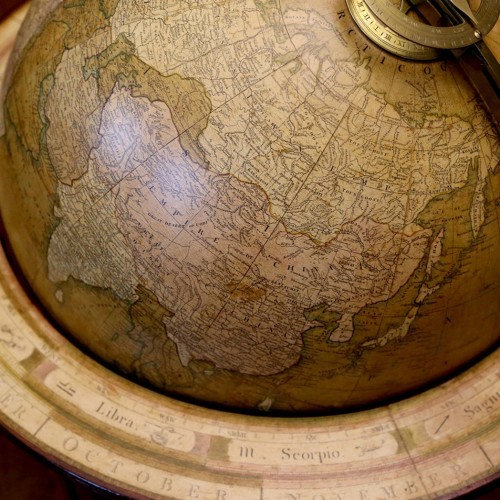Application portal is closed for the 2026 fellowship program.
Established in 1994, Monticello's Robert H. Smith International Center for Jefferson Studies (ICJS) is a multidisciplinary research center that leads the study of Thomas Jefferson and his world and supports the ongoing work of preservation and education at Monticello. To date, the ICJS has awarded more than 600 fellowships to researchers from around the country and globe.
ICJS has introduced two newly developed cohorts of fellows: the Semester Cohorts and Yearlong Hybrid Cohorts.
Applicants may select which fellowship type they wish to be considered for. Applications close on November 17, 2025.
Semester Cohorts
Description: Monticello’s ICJS will be hosting Semester Cohorts of fellows each fall and spring. Fellows are expected to be on site in Charlottesville, to utilize resources at ICJS, where they will have access to Monticello’s expert staff and holdings at the Jefferson Library as well as the resources at nearby institutions, including libraries at the University of Virginia. Fellows are also expected to be active and engaged members of Monticello’s community. Fellows in Semester Cohorts receive a stipend of $4,500 per month for fourth months, paid monthly. Funding for this fellowship has been provided by our generous donors.
Duration: 4 months in the fall or spring. Fellows in the spring cohort are expected to be on site from late January to May 2026; fellows in the fall cohort are expected to be on site from late August to mid December 2026.
Eligibility: Open to applicants at any career stage and across many relevant fields, especially public historians, researchers, and scholars, from any country. Successful applicants will be working on Jefferson Studies (broadly defined), the founding of the United States, and its legacies. See FAQs for more eligibility information.
Residency: During the fellowship, fellows must reside in Central Virginia to ensure access to Monticello’s staff, collections, and the Jefferson Library. See FAQs for housing information.
Expectations: Active participation in Monticello’s community; attend regular events at Monticello and ICJS upon request and participate in cohort gatherings; present a 60-minute forum during residency; significant progress on a major project.
Transportation: ICJS is in a rural setting with no public transit—fellows need their own vehicle, a rental car, or other arrangements.
Stipend: $4,500 per month.
Yearlong Hybrid Cohorts
Description: Monticello’s ICJS will be hosting Yearlong Hybrid Cohorts of fellows, beginning in the summer and lasting 12 months. This low-residency fellowship cohort will be primarily virtual, with fellows conducting their research offsite, with occasional visits to Monticello. Fellows receive a stipend of $5,000 for the year. Fellows in the Yearlong Hybrid Cohorts will actively participate in their cohort gatherings hosted online and in-person. Funding for this fellowship has been provided by our generous donors.
Duration: 12-month term beginning July 1st, 2026 and ending June 30th, 2027.
Eligibility: Open to all applicants, especially artists, civic leaders, journalists, graduate students, public historians, researchers, early career scholars, and teachers from any country. Successful applicants will be working on Jefferson Studies (broadly defined), the founding of the United States, and its legacies. See FAQs for more eligibility information.
Format: Primarily remote work with two onsite gatherings in fall 2026 and spring 2027.
Stipend and Support: $5,000 total stipend; 7 nights of hotel lodging, meals, and local transportation provided during visits.
Expectations: Participation in hybrid fellowship gatherings; completion of one major project per fellowship; participation in a public forum at Monticello.
Contact
For application questions, please contact Nicole Brown at nbrown@monticello.org.
Fellowship cohorts are underwritten by endowments established for this purpose by the Batten Foundation and First Union National Bank of Virginia.
Frequently Asked Questions
Fellowships are open to all, especially:
- Archaeologists
- Artists
- Civic leaders
- Curators
- Graduate students
- Historians
- Independent scholars
- Material culture/decorative arts professionals
- Preservationists
- Public historians
Open to U.S. citizens and international applicants.
International applicants to the Semester Cohorts must secure their own visas to reside in the United States during the duration of their fellowship.
Applicants must submit:
- A completed application form
- A curriculum vitae
- A completed project proposal and a plan that identifies project outcomes (maximum 500 words)
- Professional bio (maximum 300 words)
- Two letters of reference
Semester Cohorts: Housing is not provided. Stipends are intended to cover housing, transportation, and living costs. Fellows must make their own arrangements. Suggestions for finding housing in and around Charlottesville will be shared with successful applicants upon request.
Yearlong Hybrid Cohorts: Lodging and transportation provided during onsite visits.
Fellows will be reimbursed for economy travel to and from Monticello at the beginning and end of their fellowship period. Stipends will be paid monthly, or more frequently as needed.
The Jefferson Library is a leading repository on Thomas Jefferson, Monticello, and early America. Fellows—onsite or remote—will have access to the physical and digital collections. Explore the collections and databases.
Libraries at the nearby University of Virginia have extensive archives, journal articles, books, and more for fellows to utilize in their research. Explore the collections and databases.
To learn more about past research at ICJS, visit Monticello’s ICJS website here.

